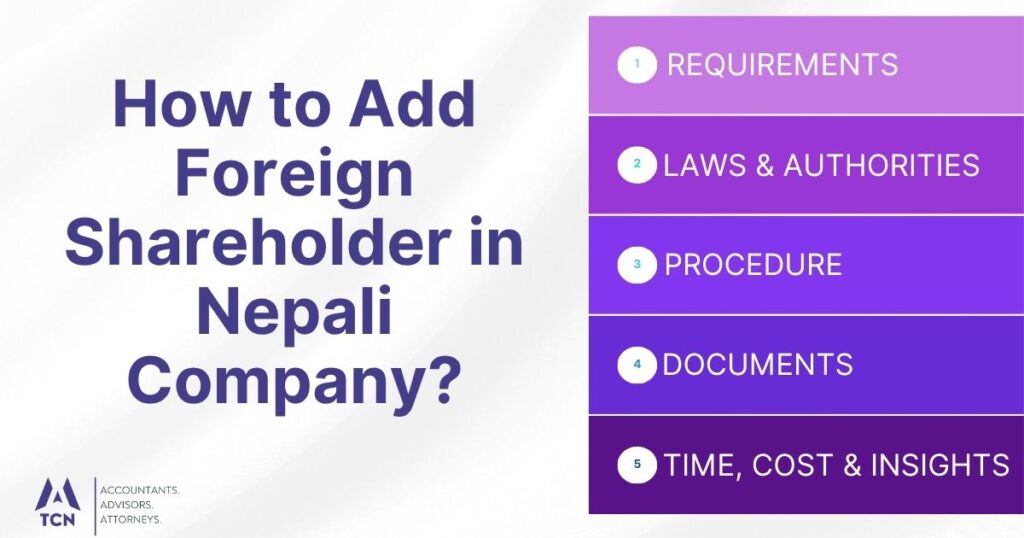Introduction and Legal Framework
Adding a foreign shareholder to a Nepali company represents a significant step in expanding business operations and attracting foreign direct investment (FDI) in Nepal. The process involves comprehensive legal procedures governed by the Foreign Investment and Technology Transfer Act (FITTA) 2019 and the Company Act 2063 (2006).
Nepal’s investment laws have evolved to encourage foreign participation in various sectors, making it increasingly attractive for international investors. The Department of Industry (DOI) serves as the primary regulatory body overseeing foreign investment approvals and company registration processes.
Foreign shareholders can participate in Nepali companies through equity investment, bringing capital, technology, and expertise. However, the process requires strict adherence to Nepal’s regulatory framework, including sector-specific investment limitations and approval procedures.
The legal framework distinguishes between different types of foreign investment, including manufacturing investment Nepal, service sector investments, and technology transfer arrangements. Each category has specific requirements and approval processes that companies must navigate carefully.
Requirements for Adding Foreign Shareholders
Legal Eligibility Criteria
Foreign investors must meet specific eligibility requirements under FITTA 2019. The Act defines foreign investment as investment made by foreign investors in any industry or business within Nepal. Foreign investors include foreign nationals, foreign companies, and non-resident Nepali citizens.
The investment must align with Nepal’s industrial policy and contribute to economic development. Certain sectors remain restricted or require special approvals, including telecommunications, banking, and defense-related industries.
Minimum Investment Thresholds
FITTA 2019 establishes minimum investment requirements for foreign shareholders:
- Manufacturing industries: Minimum NPR 50 million investment
- Service industries: Minimum NPR 20 million investment
- Energy sector: Minimum NPR 100 million investment
- Tourism sector: Minimum NPR 50 million investment
These thresholds ensure that foreign investment contributes meaningfully to Nepal’s economic development while maintaining regulatory oversight.
Sector-Specific Restrictions
Nepal investment laws impose sector-specific limitations on foreign ownership:
- Banking and financial services: Maximum 75% foreign ownership
- Telecommunications: Maximum 80% foreign ownership
- Hydropower: 100% foreign ownership permitted
- Manufacturing: Generally 100% foreign ownership allowed
Companies must verify sector-specific restrictions before proceeding with foreign shareholder addition.
Detailed Process for Adding Foreign Shareholders
Step 1: Conduct Feasibility Assessment and Legal Review
Begin by conducting a comprehensive feasibility assessment of the proposed foreign investment. Review the existing company’s memorandum and articles of association to ensure they permit foreign shareholding. Examine sector-specific regulations and investment limitations applicable to your business.
Engage qualified legal counsel specializing in Nepal investment laws to review compliance requirements. Assess the impact of foreign shareholding on existing shareholders’ rights and company governance structure. Determine whether the proposed investment requires amendments to company documents or board resolutions.
Prepare a detailed investment proposal outlining the foreign investor’s background, investment amount, and intended business activities. This assessment forms the foundation for subsequent regulatory applications and ensures compliance with FITTA 2019 requirements.
Step 2: Obtain Board Resolution and Shareholder Approval
Convene a board meeting to approve the addition of foreign shareholders. Pass a board resolution authorizing the issuance of shares to foreign investors and approving necessary amendments to company documents. Ensure the resolution complies with the Company Act 2063 requirements.
Organize an extraordinary general meeting (EGM) to obtain existing shareholders’ approval for foreign investment. The EGM must approve share issuance, capital increase, and any amendments to the memorandum and articles of association. Maintain detailed minutes of all meetings for regulatory submission.
Prepare and execute share subscription agreements with foreign investors, clearly defining investment terms, shareholding percentages, and governance rights. Ensure agreements comply with Nepal’s foreign exchange regulations and investment laws.
Step 3: Submit Application to Department of Industry
Prepare and submit a comprehensive application to the Department of Industry for foreign investment approval. The application must include detailed project information, financial projections, and compliance documentation. Submit applications through the Industrial Enterprise Development Board (IEDB) online portal.
Include all required supporting documents, including company registration certificates, tax clearance certificates, and foreign investor credentials. Pay applicable processing fees as prescribed under FITTA 2019 regulations.
The DOI reviews applications for compliance with investment policies, environmental requirements, and sector-specific regulations. Respond promptly to any queries or requests for additional information during the review process.
Step 4: Obtain Regulatory Approvals and Clearances
Secure necessary regulatory approvals from relevant government agencies. Manufacturing companies may require environmental clearance from the Ministry of Forests and Environment. Financial services companies need Nepal Rastra Bank approval.
Obtain tax identification numbers for foreign shareholders from the Inland Revenue Department. Register with the Foreign Exchange Management Department (FEMD) of Nepal Rastra Bank for foreign exchange compliance.
Complete sector-specific licensing requirements, such as industrial licenses for manufacturing or service licenses for service sector investments. Ensure all approvals are obtained before proceeding with share transfer.
Step 5: Complete Share Transfer and Registration
Execute formal share transfer documents transferring shares to foreign investors. Update the company’s share register to reflect new shareholding structure and foreign investor details. Amend the memorandum and articles of association if required.
File necessary documents with the Office of Company Registrar (OCR) to update company records. Submit annual returns reflecting the new shareholding structure and foreign investment details.
Register the foreign investment with Nepal Rastra Bank’s Foreign Investment Division. Obtain foreign investment registration certificates and ensure compliance with ongoing reporting requirements under FITTA 2019.
Documents Required
Company Documents
Companies must prepare comprehensive documentation for foreign shareholder addition:
- Current memorandum and articles of association
- Board resolutions approving foreign investment
- Extraordinary general meeting minutes and resolutions
- Updated share register and shareholding structure
- Company registration certificate and tax clearance
Foreign Investor Documentation
Foreign investors must provide extensive documentation:
- Passport copies and visa status documentation
- Company registration certificates (for corporate investors)
- Financial statements and bank references
- Investment source documentation and fund transfer records
- Power of attorney for local representatives
Regulatory Submission Documents
Regulatory submissions require specific documentation:
- DOI application forms with project details
- Environmental impact assessments (if applicable)
- Technical collaboration agreements
- Foreign exchange compliance certificates
- Sector-specific licensing applications
Time Frame and Associated Costs
Processing Timeline
The foreign shareholder addition process typically requires 60-90 days for completion. DOI application review takes 30-45 days, while additional regulatory approvals may require 15-30 days. Complex projects or those requiring environmental clearances may take longer.
Manufacturing investment Nepal projects often experience shorter processing times due to government priority. Service sector investments may require additional documentation and longer review periods.
Cost Structure
The cost structure includes various government fees and professional charges:
Government Fees:
- DOI application fee: NPR 5,000-25,000 (based on investment size)
- Company registration amendment fee: NPR 2,000-5,000
- Foreign investment registration fee: NPR 10,000-50,000
Professional Costs:
- Legal consultation fees: NPR 100,000-500,000
- Accounting and compliance services: NPR 50,000-200,000
- Translation and documentation costs: NPR 25,000-75,000
Total costs typically range from NPR 200,000 to NPR 1,000,000, depending on investment complexity and professional service requirements.
Post-Registration Compliance Obligations
Ongoing Reporting Requirements
Foreign shareholders must comply with ongoing reporting obligations under FITTA 2019. Companies must submit annual foreign investment reports to the Department of Industry, detailing investment utilization, employment generation, and business performance.
Nepal Rastra Bank requires quarterly foreign exchange reports documenting fund transfers, dividend repatriations, and foreign currency transactions. Maintain detailed records of all foreign exchange transactions for regulatory compliance.
Tax Compliance and Obligations
Foreign shareholders must comply with Nepal’s tax laws, including income tax on dividends and capital gains. Register with the Inland Revenue Department and obtain permanent account numbers (PAN) for tax purposes.
Companies with foreign shareholders must file annual tax returns and maintain proper accounting records. Comply with transfer pricing regulations for related-party transactions and ensure proper documentation of international transactions.
Corporate Governance Requirements
Implement proper corporate governance structures accommodating foreign shareholders’ rights and obligations. Maintain board composition requirements and ensure compliance with the Company Act 2063 provisions regarding foreign directors.
Conduct regular board meetings and general meetings in accordance with legal requirements. Maintain proper corporate records and ensure transparency in financial reporting and shareholder communications.
Frequently Asked Questions (FAQs)
What sectors allow 100% foreign ownership in Nepal? Manufacturing, hydropower, tourism, and most service sectors permit complete foreign ownership. However, banking, telecommunications, and certain strategic sectors have ownership restrictions under current Nepal investment laws.
How long does the foreign shareholder addition process take? The complete process typically requires 60-90 days, including DOI approval, regulatory clearances, and documentation. Manufacturing investment Nepal projects may receive priority processing, potentially reducing timeframes significantly.
Where should foreign investment applications be submitted? Submit applications to the Department of Industry through the Industrial Enterprise Development Board online portal. Additional sector-specific approvals may require submissions to relevant ministries and regulatory bodies.
What are the minimum investment requirements for foreign shareholders? FITTA 2019 requires minimum investments of NPR 50 million for manufacturing, NPR 20 million for services, and NPR 100 million for energy sector investments in Nepal.
What is the total cost for adding foreign shareholders? Total costs range from NPR 200,000 to NPR 1,000,000, including government fees, legal consultation, documentation, and compliance costs, depending on investment complexity and professional service requirements.


